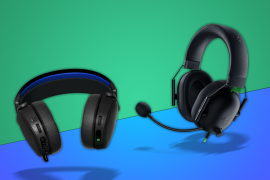Google Home Mini review
This voice-controlled doughnut of power is a genuine Echo Dot rival
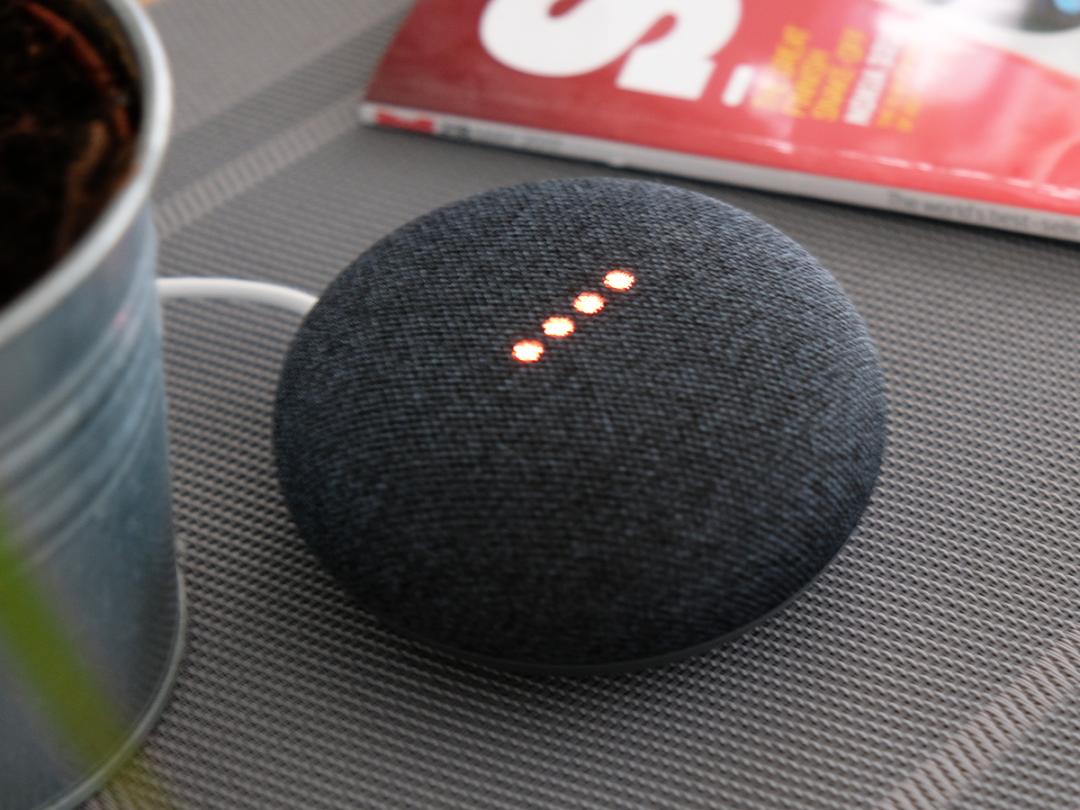
It’s been just a year since it became socially acceptable to talk to your house. Before the autumn of 2016, we had to use our hands to set alarms and turn on lights. The indignity! But then the original Amazon Echo and Echo landed in the UK, quickly followed by the Google Home just six months ago.
Feels like longer, doesn’t it? That’s because once you’ve welcomed either Alexa or Google’s Assistant into your house, it’s like they’ve always been there, controlling your smart home and being the know-all you once pretended to be. Well, now resistance is even tougher, because Google has a new, impulse buy assistant to rival the Echo Dot, called the Home Mini.
This furry little doughnut can do everything its bigger, £119 brother can do, except match the Home’s powerful speaker. Is it a better gateway drug to voice-controlled tech than the Echo Dot? That depends on what you already own, and what you want to use it for…
Design: cute as a smart button

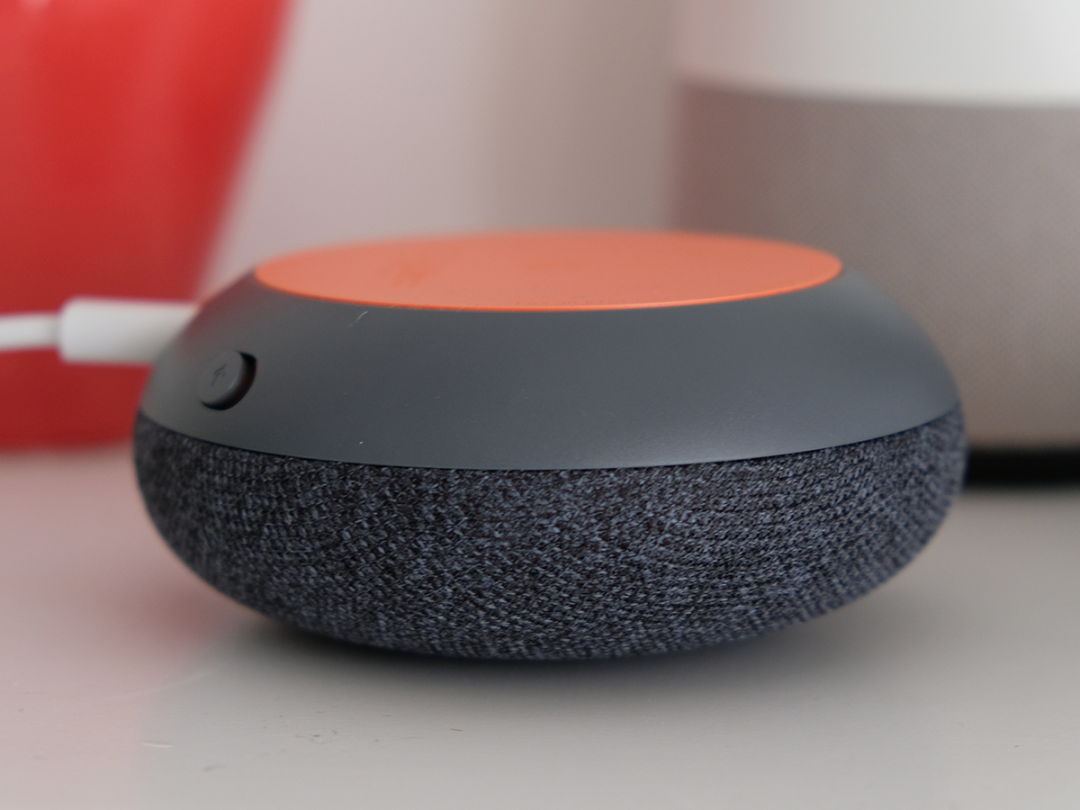
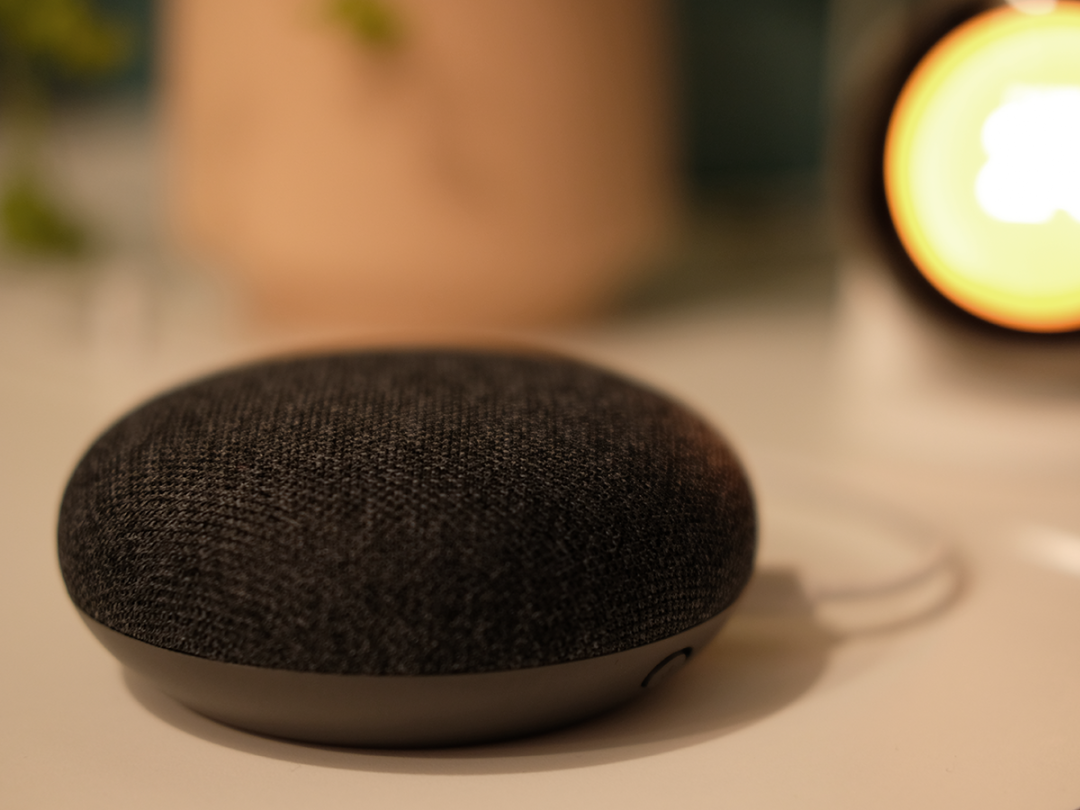
The design process for the Home Mini was simple. Google’s designers just listed all of the Echo Dot’s traits on a whiteboard, then just came up with polar opposites.
Sharp edges and plastic on the Dot? That’ll be bespoke fabric and zero corners for the Home Mini, then. A blue light ring and physical volume buttons for Alexa? We’ll go for hidden LEDs and touch controls. The Dot’s only available in black and white? Grey, black and orange versions for the Home Mini, then, which we’ll call ‘charcoal’, ‘chalk’ and ‘coral’. And so on.
The result is a win for desirability, if a slight loss for practicality. There’s no doubt the Home Mini is a much prettier object than the Echo Dot, despite being a smidgen wider. It’s friendly-looking and has a ‘good guy’ feel compared to its rival’s Darth Vader black.
But there are a couple of issues. Firstly, Google has had to ‘permanently remove’ all of the top touch functionality on the Home Mini. To explain: the original idea was to let you tap the fabric on top to play or pause music, and also ‘press and hold’ to call up the assistant. But a bug meant that some units’ touch panels turned on randomly, so Google has had to can those functions.
You can still turn the volume up and down by tapping either side of the LEDs, but it’s a shame you now have to say “Ok Google, pause” to stop a morning alarm, rather than just hitting the top with your hand.
The extreme minimalism also means there’s no place for a 3.5mm jack, which the Echo Dot has. This means you can’t hook it up directly to some old speakers to give them voice control. Instead, you’ll need a Chromecast Audio or a Cast-enabled speaker.
Still, there is at least a mute button on the side if your paranoid guests freak out about your mysterious orb. And if those two big missing features (working buttons on the top, and a line out) aren’t a big deal for you, it’s unquestionably the best-looking smart speaker you can buy.
Whether it’s the most capable is another matter…
Musical talents: louder but more limited
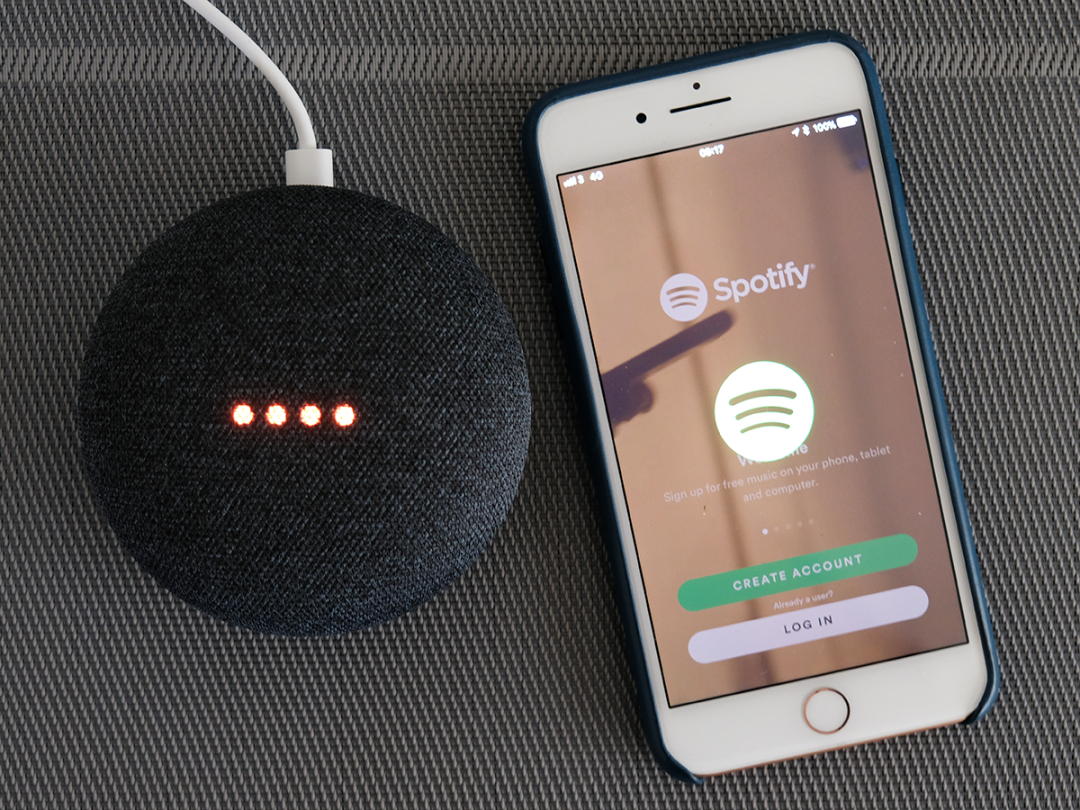
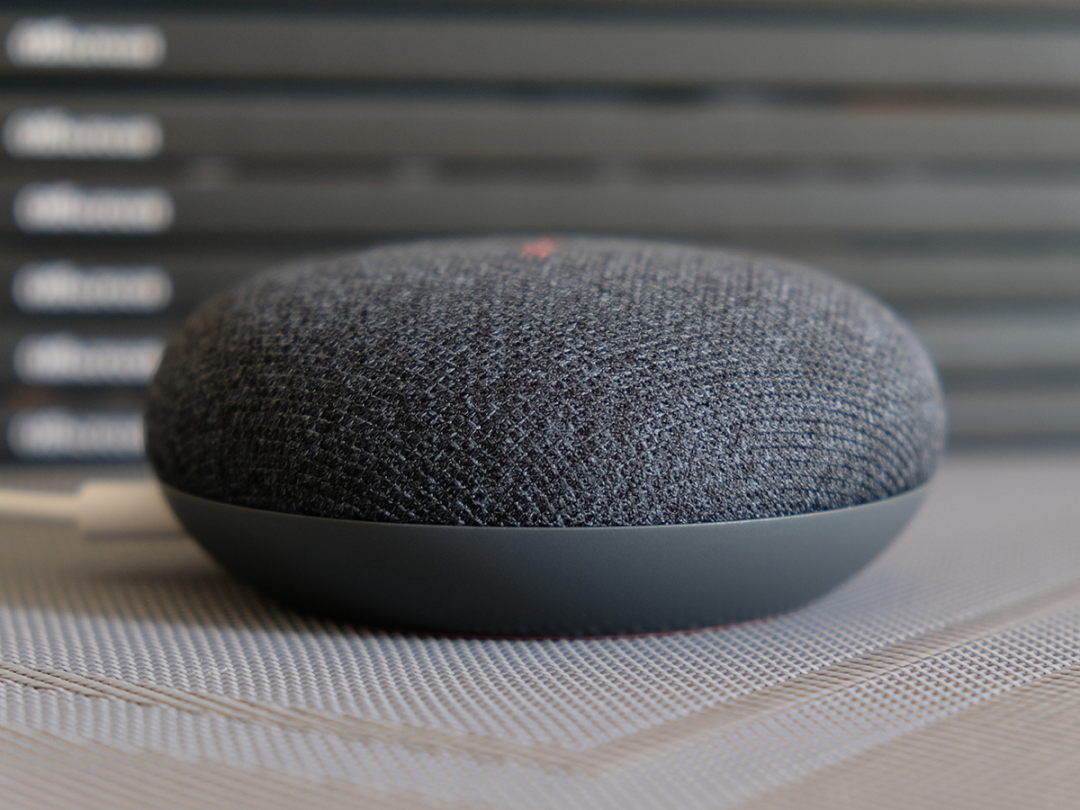
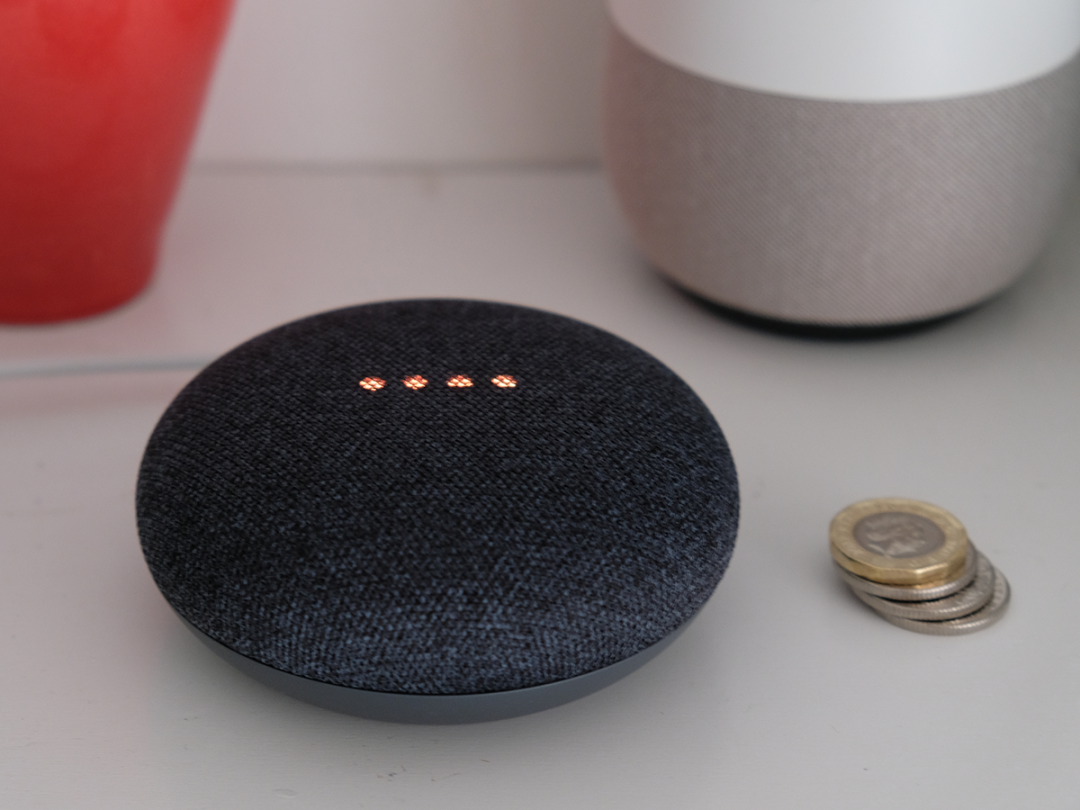
So what can the Home Mini actually do? Aside from controlling your smart home, answering obscure questions and adding things to your shopping list, the most useful is hands-free music control.
Not that the Home Mini is really a standalone speaker itself. It does comfortably sound better than the tinny Echo Dot, and offers some surprisingly good bass for one so small. This also means the Assistant’s voice is clearer than Alexa at loud volumes.
Sadly, unlike the Echo Dot, you can’t use the Home Mini to voice control any of those speakers, because it doesn’t have Bluetooth out. What you can do, though, is ask it to play Spotify, Google Play Music or TuneIn Radio through a ChromeCast Audio-connected speaker or one of the growing number that’s already Cast-enabled.
If you don’t have the latter, then that’s another £30 outlay. But the benefit is better sound quality compared to Bluetooth (there’s less compression over Wi-Fi) and the fact that Google Home assistants now support multi-room music. Yep, some Home Minis plus Chromecast Audio-connected speakers is a darn sight cheaper than a Sonos-Alexa setup.
Still, the Echo Dot does now support multi-room music when connected to other speakers (aside from with Spotify, which is coming later this year). And I do wish the Home Mini had just replaced the ChromeCast Audio by offering a line out connection.
When it comes to music, Amazon’s mini speaker is still the most versatile little voice assistant around.
Knowledge: Mastermind champion
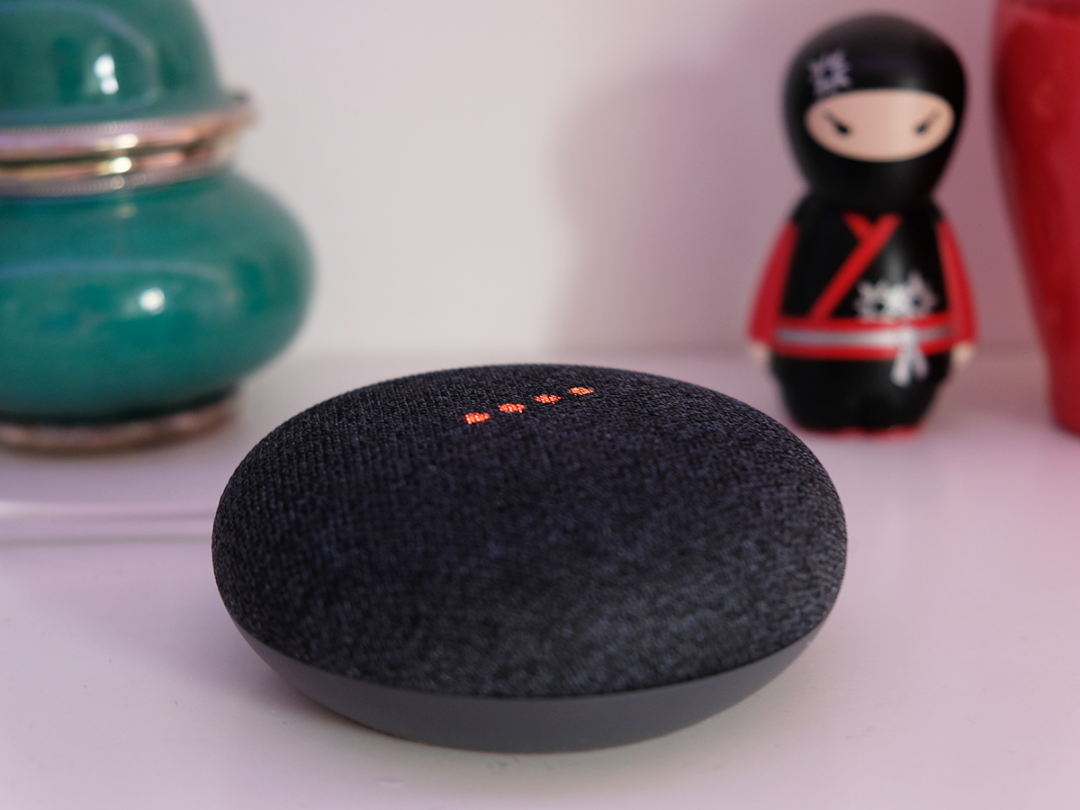
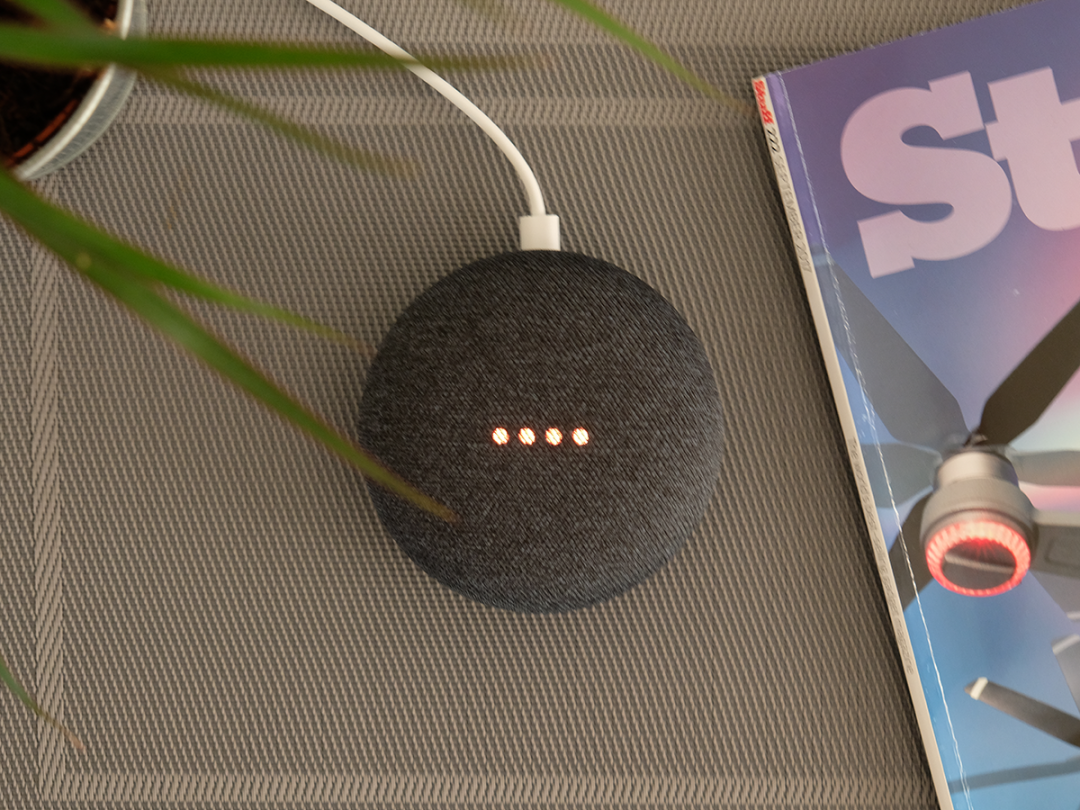
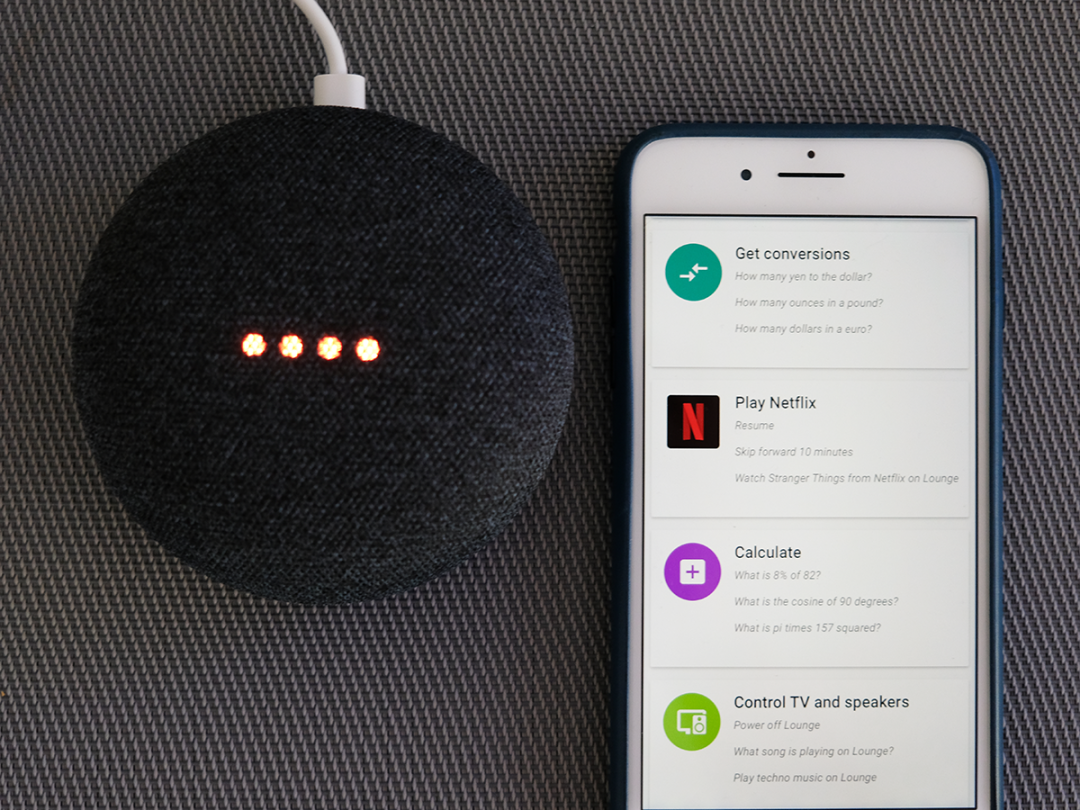
Put the Home Mini and Echo Dot in the black chair, though, and there’d only be one winner.
The Echo Dot is fine with straight, factual questions. ‘How many euros to the pound?’, for example, though neither speaker chose to rub this in with a sad trombone sound.
But the Home Mini (and its bigger brother) really start to shine when you move onto slightly more abstract or childlike questions.
When I asked it ‘does it rain diamonds on Neptune?’, ‘where do thoughts come from?’, ‘what came before the big bang?’, ‘can gravity slow down time?’ and ‘how do speakers work?’, it gave a thoughtful answer each time, where the Echo Dot could only flounder with a ‘sorry, I don’t know that one’. The smart speaker equivalent of a head-shaking ‘pass’.
The caveat here is that the Home Mini often relied on third party sites for its info, many of which I hadn’t heard of. So although it sounds confident, you might not want to necessarily rely on it for GCSE science coursework.
Still, this knowledge plus two forthcoming new features mark the Home Mini out as the best smart speaker for young families.
The first, called broadcast, lets you send a voice message to all other Home devices in your house. No more banging on the ceiling with a broomstick to say when dinner’s ready.
Secondly, Google has teamed up with Disney to bring audio stories from the likes of Mickey Mouse and Lightning McQueen to Home speakers. Your bored kids will be able to summon these by simply saying ‘Hey Google, tell me a story’, as your babysitter looks on feeling slightly obsolete.
Frankly, Google’s Assistant is also just friendlier and more natural to talk to than the more austere Alexa. It’s like the babysitter you always warmed to as a kid, versus your icier schoolteacher.
The trouble is, the schoolteacher also probably helped you get more done…
Smart home: covers most bases
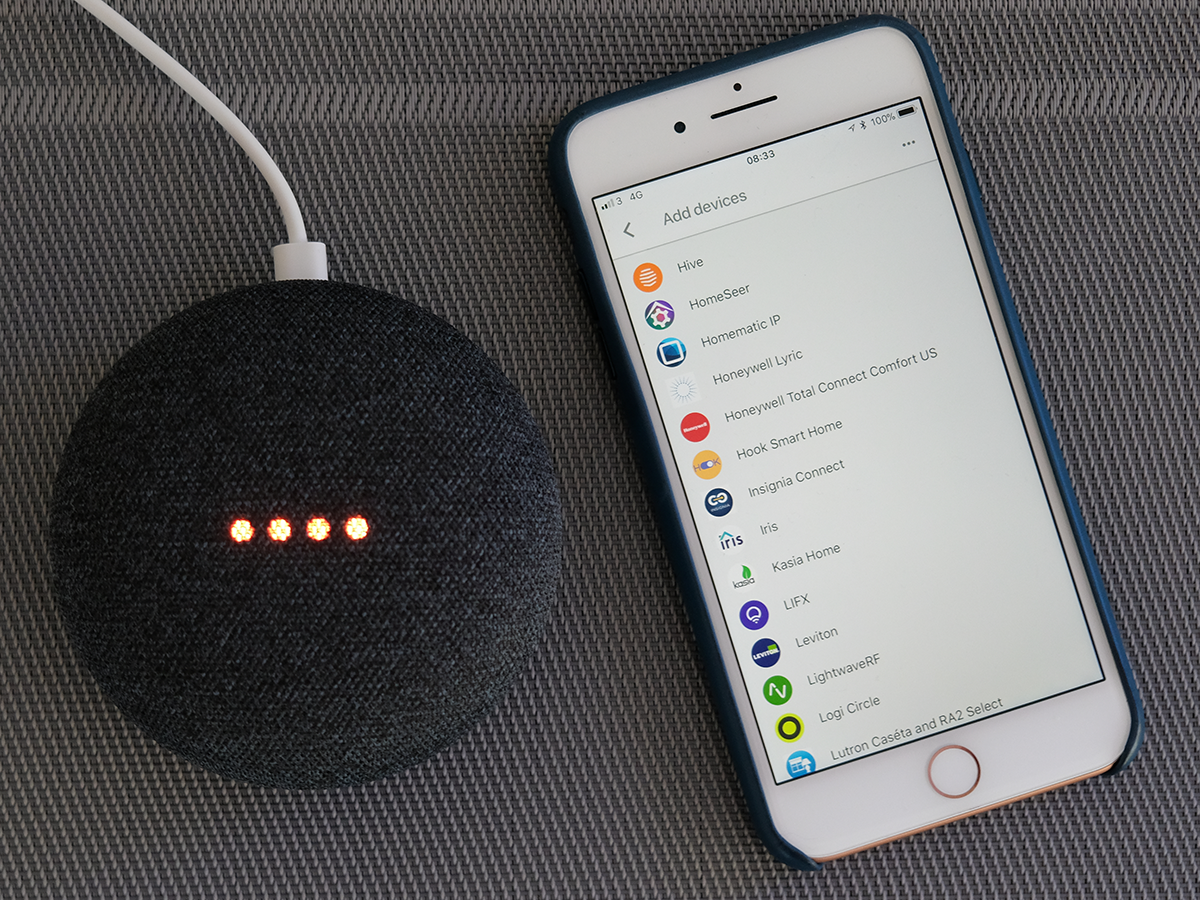
Amazon’s Alexa had a huge head start when it came to smart home support, but Google’s Homes have seriously caught up.
In fact, I’d say for most people, the Home Mini is as useful for voice controlling everything from smart lights to heating as an Echo Dot.
For example, in my flat I have some Philips Hue bulbs, Tado smart heating, a Nest Cam, Canary camera and an Awair air quality monitor. All of those bar Canary are supported by Google Home. And a lot of other missing functionality can be added either through IFTTT, or via a smart hub like Wink or Samsung’s SmartThings.
The Home Mini also works with the likes of Hive, Honeywell, Netatmo, LIFX bulbs, Belkin Wemo and, well, you get the picture. Sure, the Echo Dot still holds the numerical advantage when it comes to the number of devices it can directly voice control, but you’d need to have a black belt in smart home fu to really notice the difference these days.
Voice control is just a hell of a lot better than using apps, particularly in busy households. For example, with Tado I can now just say to the Home Mini “Hey Google, turn up the temperature in the lounge by two degrees”, thanks to the joy of smart radiator thermostats. What a time to be alive.
As a personal assistant: best for Google addicts
As fun as talking to your heating is, it’s actually the little things like reminders and shopping lists that you’ll find yourself using the most on the Home Mini.
These work best if you’re already a big user of Google’s services. For example, your calendar will be the one tied to the Google account you set up with the Home Mini. From here you can add events or hear your schedule for the day by voice, but there’s no easy way to do the same for an Outlook calendar. Strangely, the Home Mini doesn’t yet support work G Suite accounts either, unlike the Echo Dot.
Still, there are some handy little tricks that the Home Mini does better. It’s now particularly handy in the kitchen, thanks to voice support for five million recipes. You can either search for these in the Google Search app, then press ‘send to Home’. Or just ask the Assistant if she knows a good thai green curry recipe for step-by-step instructions.
Naturally, if you’re a Google Photos fan and have a Chromecast, then the Home Mini is best little assistant for you too. Thanks to Photos’ scarily clever tagging, you can just say “Hey Google, show my photos of dogs” and they’ll appear on your TV.
Less successful is Netflix and general TV control. The Home Mini takes a slightly different approach to Alexa here, making you ask really specific requests like the exact programme, rather than just using voice for general discovery and navigation like Alexa.
I couldn’t just open Netflix, for example, with the Assistant coming back with “try saying that again, but include the name of the programme you want to watch”. Right now, the voice control experience just seems a bit laggy and not as slick as just using a remote with something like the PS4 or TV’s app.
Phone calls are also apparently imminent for the Home Mini in the UK, but weren’t live yet for me.
Google Home Mini verdict
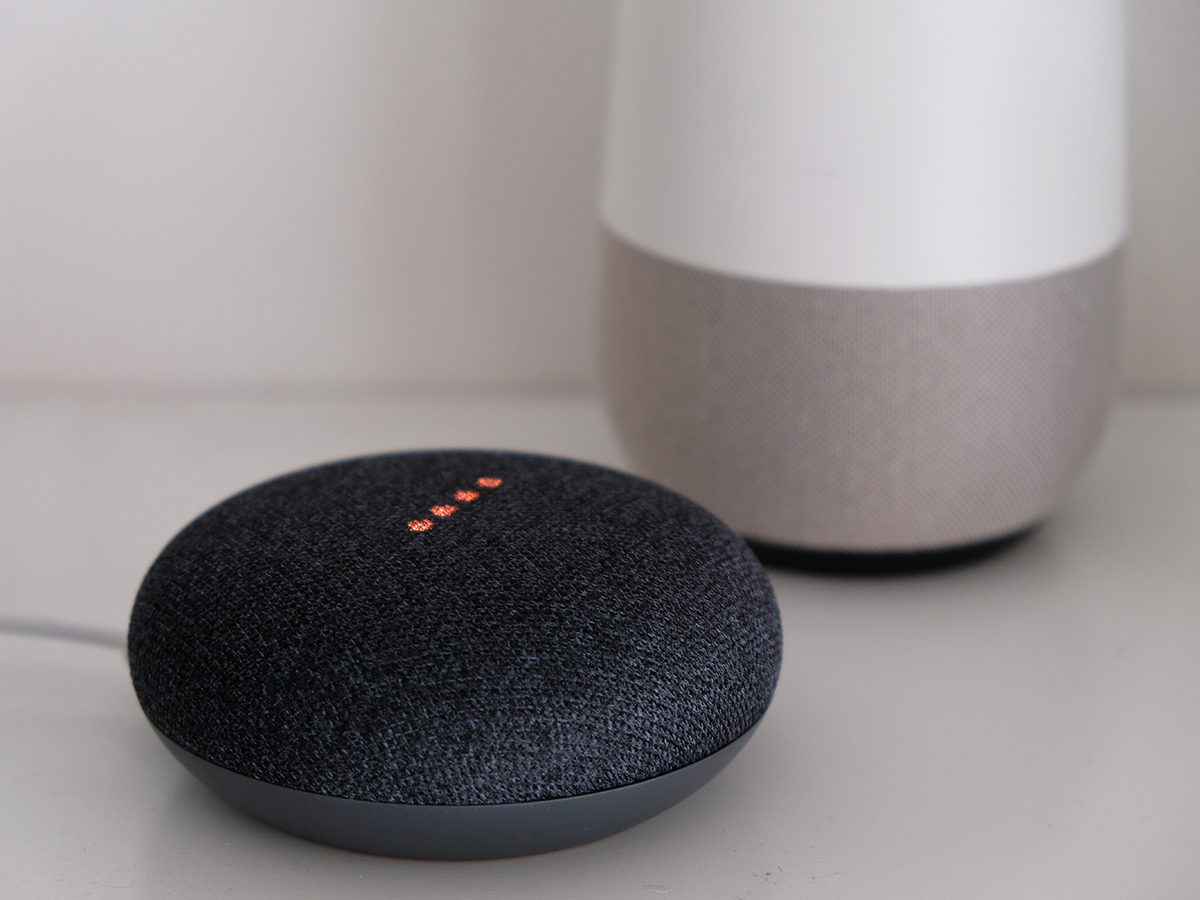
So, which mini smart speaker should you get – Google’s doughnut or Amazon’s hockey puck? It depends on a few things. Firstly, whether you’d prefer an friendly, engaging digital assistant (the Home Mini) or a more efficient, if slightly robotic one (the Echo Dot).
But it also depends on what you’re going to use it for. The Home Mini does a lot right and is better than the Echo Dot in a few areas. It looks and sounds much better. It’s also far more likely to have a stab at answering random trivia questions, making it the best bet for young families with inquisitive kids.
Another strength is controlling your smart home, with Google’s Home family supporting most major brands now (although it’s worth checking the compatibility list). Alexa certainly has more ‘skills’ for connecting to third party services, but it’s pretty close when it comes to smart lights and heating. If you and your family mostly use Google services (like Photos, Calendar and Chromecasts), the Home Mini is likely to be the better bet too. Unless you want to connect it to your work Gmail calendar, strangely.
But for everyone else, the Echo Dot remains the best all-round mini smart speaker. Unlike the Home Mini, it has a line out and can play through Bluetooth speakers, making it the more versatile musical assistant. It’s also better for voice shopping (at least in the UK) and will support voice recognition soon.
One thing’s for sure – at £49, both are bona fide tech bargains that are now better entrées to the glorious world of voice control than their bigger brothers. And with new features being added on a seemingly weekly basis, they’re only going to get better.
Stuff Says…
The friendliest and most knowledgeable mini smart speaker around, but the Echo Dot remains the better all-rounder
Good Stuff
Fluffy, friendly design
Sounds better than an Echo Dot
Just as knowledgeable as bigger Home
Strong smart home support
Recognises the voices of up to six people and gives personalised replies
Good value
Bad Stuff
Doesn’t have a 3.5mm line-out or have Bluetooth out
Touch buttons on the top have been disabled
Still favours Google services over others
Echo still more versatile for music and shopping



